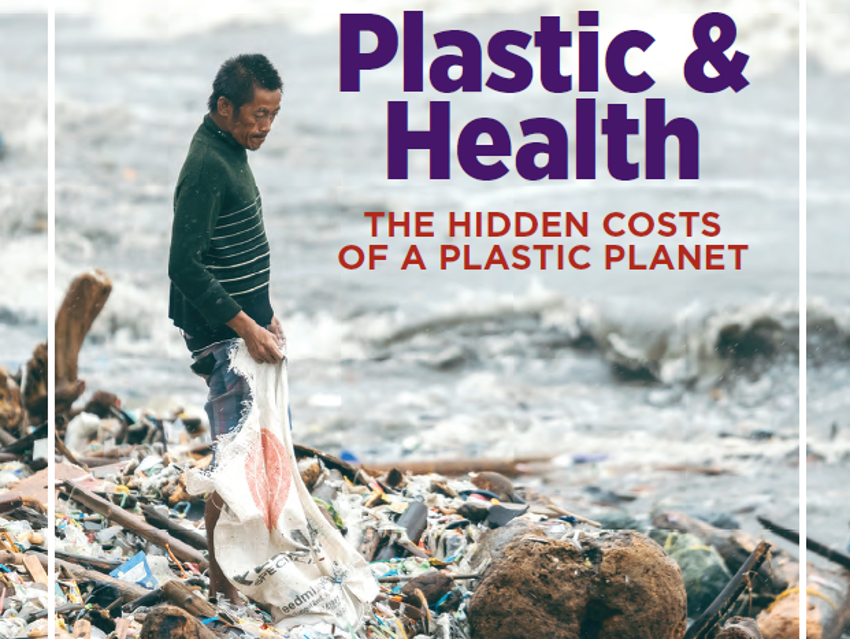The report Plastic & Health: The Hidden Costs of a Plastic Planet summarizes research that exposes the toxic risks plastic poses to human health at every stage of the plastic lifecycle. It has been authored by CIEL, Earthworks, GAIA, HBBF, IPEN, Texas Environmental Justice Advocacy Services, University of Exeter, and UPSTREAM.
According to the report, the current approaches to asses and address plastic impacts are inadequate and inappropriate. A lifecycle approach is required to make informed decisions that address plastic risks. Reducing toxic exposure requires many solutions because plastic has a complex lifecycle. The supply chains and the impacts of plastic cross and re-cross borders, continents, and oceans. No country can effectively protect its citizens from these impacts on its own.
Risks to human health along the lifecycle of plastic include:
- Extraction and transportation of fossil feedstocks for plastic
releases toxic substances into the air and water, including those with known health impacts like cancer, neurotoxicity, reproductive and developmental toxicity, and impairment of the immune system - Refining and production of plastic resins and additives
releases carcinogenic and other highly toxic substances into the air with effects including impairment of the nervous system, reproductive and developmental problems, cancer, leukemia, and genetic impacts like low birth weight - Consumer products and packaging
can lead to ingestion and/or inhalation of microplastic particles and hundreds of toxic substances - Plastic waste management, especially “waste-to-energy” and other forms of incineration
releases toxic substances including heavy metals such as lead and mercury, acid gases, and particulate matter; they can enter the air, water, and soil causing both direct and indirect health risks for workers and nearby communities - Fragmenting and microplastics
enter the human body directly and lead to health impacts including inflammation, genotoxicity, oxidative stress, apoptosis, and necrosis; these are linked to negative health outcomes ranging from cardiovascular disease to cancer and autoimmune conditions - Cascading exposure as plastic degrades
toxic chemicals concentrated in plastic leach into the environment and human bodies - Plastic accumulates in food chains through agricultural soils, terrestrial and aquatic food chains, and the water supply
creates new opportunities for human exposure
Graham Forbes, Greenpeace Global Plastics Project Leader, thinks that “the health risks of the plastic pollution crisis have been ignored for far too long, and must be at the forefront of all decisions on plastics moving forward.” In his opinion, “corporations and governments are risking our health to maintain the status quo and keep profits flowing. It’s not just our oceans and marine animals that are suffering from this addiction to plastics, it’s all of us.”
Even with the limited data available, the findings of the report say clearly that the health impacts of plastic throughout its lifecycle are overwhelming. “Many actions and solutions are needed to confront this threat to human life and human rights. To be effective, they must ultimately reduce the production, use, and disposal of plastic and associated toxic chemicals.”
- Center for International Environmental Law (CIEL), Washington DC, USA
- Earthworks, Washington, D.C., USA
- Global Alliance for Incinerator Alternatives (GAIA), Quezon City, Philippines
- Healthy Babies Bright Futures (HBBF), USA
- IPEN, Malmö, Sweden
- Texas Environmental Justice Advocacy Services (t.e.j.a.s.), Houston, TX, USA
- University of Exeter, UK
- UPSTREAM, Damariscotta, ME, USA
- Full Report: Plastic & Health: The Hidden Costs of a Plastic Planet, 2019.
- Executive Summary: Plastic & Health: The Hidden Costs of a Plastic Planet, 2019.
- Interview: Microplastics – A Global Catastrophe,
Vera Koester, Jane Bremmer,
ChemViews Mag. 2019.
https://doi.org/10.1002/chemv.201900006
Jane Bremmer, co-founder of the Australian Alliance for a Clean Environment, on what should and what should not be done




